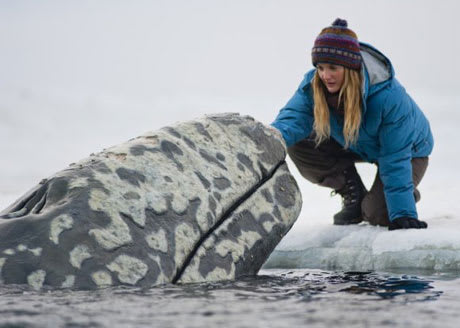To summarize and clarify the appeal, or annoyance, of Big Miracle, the sort-of-true story of three gray whales trapped under the ice-covered Beaufort Sea, miles from water, in post-Cold War Alaska, you need only assess your personal reaction to the following assertion: "Even though whales are big and powerful, they're just like us. We're vulnerable and we get scared and we need help sometimes too!"
Now, to be fair, anthropomorphizing animals in a grotesquely narcissistic manner isn't anything new. And if last year's Dolphin Tale taught us anything, it's that good, old fashioned, wholesome (read: antiquated) Christian values juxtaposed with imperilled marine animals still sell movie tickets. Moreover, even though every generic adventure or rescue movie features ex-lovers ― here, aspiring small-town reporter Adam (John Krasinski) and idealist Greenpeacer Rachel (Drew Barrymore) ― bickering endlessly, only to realize that they work better together than apart, it still seems to warm the cockles of an audience trapped in a romanticized, greeting card alternate reality.
Of course, being loosely ― and I mean loosely ― based on Tom Rose's 1989 book, Freeing the Whales: How the Media Created the World's Greatest Non-Event, there are a few other one-note personalities bouncing around the periphery of this do-gooder extravaganza. A big-oil tycoon (Ted Danson) has some interest in the story, as does L.A. bitch reporter Jill (Kristen Bell), who is the only character to even hint at the implications of Rose's novel, along with an Alaskan National Guard Colonel (Dermot Mulroney) and a Reagan staffer (Vinessa Shaw).
And in case the many close-ups of cassettes, walkmans and other out-dated minutiae didn't remind us of the times, Gorbachev's glasnost-era Soviet navy shows up, reminding us that we all need to work together to help other, rather than fighting pesky cold wars.
It's important to note that these saccharine, inadvertently counterproductive ideals do reflect the dominant North American ideology, making the many scenes of Drew Barrymore crying about whales while Krasinski pats her on the shoulder identifiable for the masses.
There's an accessibility and familiarity to it all that makes the unbearable condescension almost affable. Just be warned that if the statement about whales being "just like us" made you snicker at all, this movie isn't for you.
(Universal)Now, to be fair, anthropomorphizing animals in a grotesquely narcissistic manner isn't anything new. And if last year's Dolphin Tale taught us anything, it's that good, old fashioned, wholesome (read: antiquated) Christian values juxtaposed with imperilled marine animals still sell movie tickets. Moreover, even though every generic adventure or rescue movie features ex-lovers ― here, aspiring small-town reporter Adam (John Krasinski) and idealist Greenpeacer Rachel (Drew Barrymore) ― bickering endlessly, only to realize that they work better together than apart, it still seems to warm the cockles of an audience trapped in a romanticized, greeting card alternate reality.
Of course, being loosely ― and I mean loosely ― based on Tom Rose's 1989 book, Freeing the Whales: How the Media Created the World's Greatest Non-Event, there are a few other one-note personalities bouncing around the periphery of this do-gooder extravaganza. A big-oil tycoon (Ted Danson) has some interest in the story, as does L.A. bitch reporter Jill (Kristen Bell), who is the only character to even hint at the implications of Rose's novel, along with an Alaskan National Guard Colonel (Dermot Mulroney) and a Reagan staffer (Vinessa Shaw).
And in case the many close-ups of cassettes, walkmans and other out-dated minutiae didn't remind us of the times, Gorbachev's glasnost-era Soviet navy shows up, reminding us that we all need to work together to help other, rather than fighting pesky cold wars.
It's important to note that these saccharine, inadvertently counterproductive ideals do reflect the dominant North American ideology, making the many scenes of Drew Barrymore crying about whales while Krasinski pats her on the shoulder identifiable for the masses.
There's an accessibility and familiarity to it all that makes the unbearable condescension almost affable. Just be warned that if the statement about whales being "just like us" made you snicker at all, this movie isn't for you.
